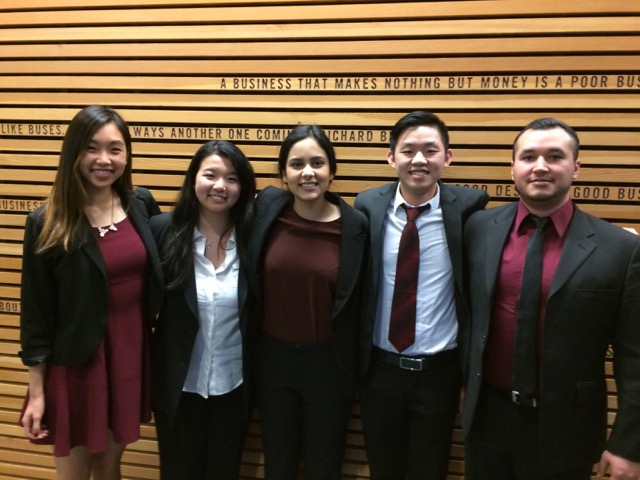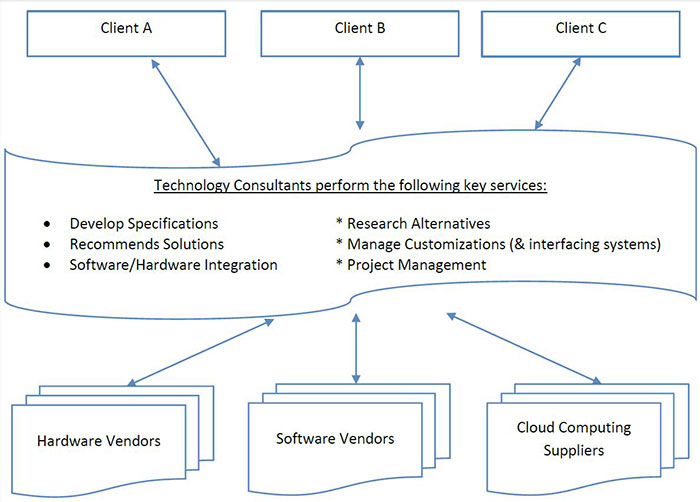Cloud competitors
Seattle is known at the “Cloud City” for more than just its infamous rainy weather. The expansion of the IT business environment has taken the city by storm. With businesses from startups to well-known B2B brands, Cloud computing clearly represents the future of business operations.
The global professional services firm, Accenture partnered with The Foster School of Business in its undergraduate capstone course (MGMT 430) – Strategy Development Case Competition. A Foster MBA student worked with Rick McPherson, the faculty course coordinator to draft a current business case. On competition day, over 100 students in 22 teams were vying for the best solution to present to senior-level leaders within the firm.

The Strategy Development Case Competition winning team
A bit of level-setting background: Accenture works with more than three-quarters of the Global Fortune 500 and 89 of the Fortune 100 Companies. They have differentiated their services by having a high degree of trust (e.g. the average client relationships are 10 years) and are known for their deep knowledge and talent in bringing wide ranging solutions to businesses. Prior to the disruption of the Cloud, Accenture served as the essential link between clients and technology service providers. The Cloud potentially enables clients to bypass Accenture’s consultants and work directly with SaaS providers (e.g. Oracle, SAP, Microsoft) and is fundamentally changing the consulting landscape (see diagram below).

The essence of the question the students were charged with was: how can Accenture remain relevant to its customers in the disruptive environment the Cloud has created.
The competition is designed to be an opportunity for students to synthesize their business knowledge and teams were able to marshal their resources to respond to this complex real-world case. Thang Nguyen, one of the winning team members said that “data analysis (was one of) the keys to success. We conducted as much research as possible to understand the industry and to seek for opening opportunities. Gathering the right information and insights helped us come up with our strategic solution.”
The way students were able to come up with new approaches while still remaining grounded in the fundamentals of Accenture’s core business was particularly impressive.
Finalists made recommendations on strategies which included establishing key partnerships, expanding internationally, building Accenture’s SaaS portfolio, and offering new Big Data analytics. The winning team identified a new market with unmet needs– the middle market. They made the firm case that middle market firms (those defined as $10 million – $1 billion in revenues) are the future Fortune 500 companies and therefore should be who Accenture targets today. The winning team members were: Inkisar Anwar, Renata Lumanau, Thang Nguyen, Amy Nguyen, and James Ortiz.
Faculty course coordinator, Rick McPherson offered: “What was different and exciting about this partnership with Accenture was that the firm brought in 12 of its own consultants to serve as coaches. The students really enjoyed and benefitted from sitting down with an expert who could poke holes in their analyses and offer feedback on their presentation. We are very grateful to Nate Kach (UW Alum ‘08) and Kevin McClelland (Foster Alum ‘02‘) for their leadership in arranging this coaching round.” For McClelland, the coaching was very impactful. “The opportunity to volunteer on campus and engage students is a rewarding experience for our leaders. We are a people company first and this is exactly what our consultants love doing.”
McClelland added: “There were a few things that stood out (about the student presentations). First, the range of recommendations – both “by the book” and “out of the box” – was impressive. Second, the way students were able to come up with new approaches while still remaining grounded in the fundamentals of Accenture’s core business was particularly impressive. Lastly, the students themselves were excellent – both in their confidence presenting on a tough topic and in the polish of their message.”
Dubbed “Team Vegas” by Robin Murdoch, Managing Director of Communications, Media & Technology at Accenture, the winning team’s proposal of middle market entry was a risky bet. Robin commended them on their analysis and quipped that “Sometimes when you bet on black, you win big.”
In business school we are given a great foundation of knowledge but beyond that it’s up to us on how we use our education to inspire new ideas and make a lasting impact on the future.
The most significant learning for Renata Lumanau “was how to identify the root cause problem of the case and think about a creative solution. (We challenged ourselves) to always ask why and to take big risks…There was definitely a big chance that the judges would completely reject our recommendation. However I’m glad we took the risk.”
The Case Competition is designed to assist the students in the transition from the academic world to their professional careers. For this team, that could not be more true. “The lessons (from the case competition) are very applicable to the real world and the kind of work many of us will be doing after graduation,” said Inkisar who will be graduating from Foster this coming June and will land in a full-time role at Accenture. From Amy Nguyen’s perspective: “In business school we are given a great foundation of knowledge but beyond that it’s up to us on how we use our education to inspire new ideas and make a lasting impact on the future.”
